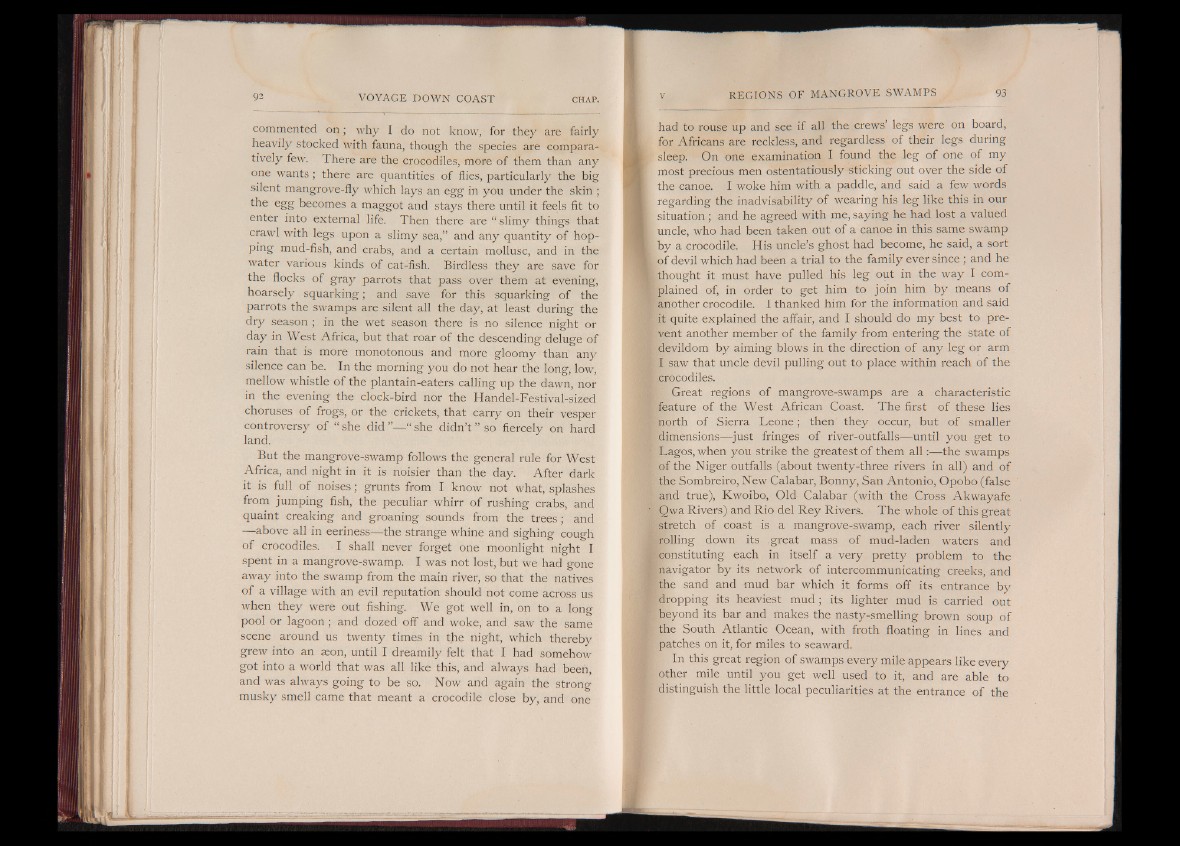
commented on ; why I do not know, for they are fairly
heavily stocked with fauna, though the species are comparatively
few. There are the crocodiles, more of them than any
one wants; there are quantities of flies, particularly the big
silent mangrove-fly which lays an egg in you under the skin ;
the egg becomes a maggot and stays there until it feels fit to
enter into external life. Then there are “ slimy things that
crawl with legs upon a slimy sea,” and any quantity of hopping
mud-fish, and crabs, and a certain mollusc, and in the
water various kinds of cat-fish. Birdless they are save for
the flocks of gray parrots that pass over them at evening,
hoarsely squarking; and save for this squarking of the
parrots the swamps are silent all the day, at least during the
dry season ; in the wet season there is no silence night or
day in West Africa, but that roar of the descending deluge of
rain that is more monotonous and more gloomy than any
silence can be. In the morning you do not hear the long, low,
mellow whistle of the plantain-eaters calling up the dawn, nor
in the evening the clock-bird nor the Handel-Festival-sized
choruses of frogs, or the crickets, that carry on their vesper
controversy of “ she did ”— “ she didn’t ” so fiercely on hard
land.
But the mangrove-swamp follows the general rule for West
Africa, and night in it is noisier than the day. After dark
it is full of noises; grunts from I know not what, splashes
from jumping fish, the peculiar whirr of rushing crabs, and
quaint creaking and groaning sounds from the trees; and
— above all in eeriness-—the strange whine and sighing cough
of crocodiles. I shall never forget one moonlight night I
spent in a mangrove-swamp. I was not lost, but we had gone
away into the swamp from the main river, so that the natives
of a village with an evil reputation should not come across us
when they were out fishing. We got well in, on to a long
pool or lagoon; and dozed off and woke, and saw the same
scene around us twenty times in the night, which thereby
grew into an aeon, until I dreamily felt that I had somehow
got into a world that was all like this, and always had been,
and was always going to be so. Now and again the strong
musky smell came that meant a crocodile close by, and one
had to rouse up and see if all the crews’ legs were on board,
for Africans are reckless, and regardless of their legs during
sleep. On one examination I found the leg of one of my
most precious men ostentatiously sticking out over the side of
the canoe. I woke him with a paddle, and said a few words
regarding the inadvisability of wearing his leg like this in our
situation; and he agreed with me, saying he had lost a valued
uncle, who had been taken out of a canoe in this same swamp
by a crocodile. His uncle’s ghost had become, he said, a sort
of devil which had been a trial to the family ever since ; and he
thought it must have pulled his leg out in the way I complained
of, in order to get him to join him by means of
another crocodile. I thanked him for the information and said
it quite explained the affair, and I should do my best to prevent
another member of the family from entering the state of
devildom by aiming blows in the direction of any leg or arm
I saw that uncle devil pulling out to place within reach of the
crocodiles.
Great regions of mangrove-swamps are a characteristic
feature of the West African Coast. The first of these lies
north of Sierra Leone; then they occur, but of smaller
dimensions— just fringes of river-outfalls— until you get to
Lagos, when you strike the greatest of them a l l :— the swamps
of the Niger outfalls (about twenty-three rivers in all) and of
the Sombreiro, New Calabar, Bonny, San Antonio, Opobo (false
and true), Kwoibo, Old Calabar (with the Cross Akwayafe
Qwa Rivers) and Rio del Rey Rivers. The whole of this great
stretch of coast is a mangrove-swamp, each river silently
rolling down its great mass of mud-laden waters and
¡constituting each in itself a very pretty problem to the
navigator by its network of intercommunicating creeks, and
the sand and mud bar which it forms off its entrance by
dropping its heaviest mud; its lighter mud is carried out
beyond its bar and makes the nasty-smelling brown soup of
the South Atlantic Ocean, with froth floating in lines and
patches on it, for miles to seaward.
In this great region of swamps every mile appears like every
other mile until you get well used to it, and are able to
distinguish the little local peculiarities at the entrance of the